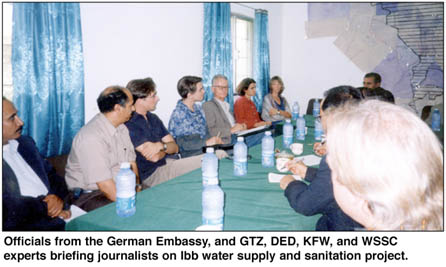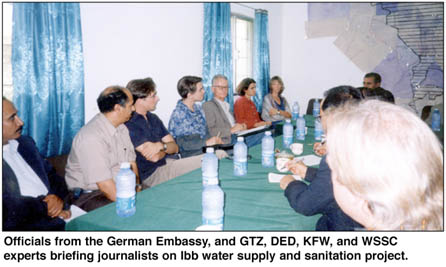
German-Yemeni co-operation in Ibb [Archives:2002/26/Reportage]
June 24 2002

ZAID SULTAN
YEMEN TIMES STAFF
For years now the Federal Republic of Germany has been a strong development partner for Yemen, but with their recent increase of economic and technical assistance the partnership has grown stronger.
Most German development projects are implemented through cooperation and development agencies like the German Agency for Technical Cooperation (GTZ), the German Development Service (DED) and the German Bank for Reconstruction (KFW).
Water supply and sanitation services have the greater share of the German support. A fully operational water supply and sewerage plant has been established in Ibb governorate to help solve the worsening water and sanitation problems.
Ibb water supply and sewerage plant is an a good example of the fruitful Yemeni-German cooperation, said Mrs. Gudrun Isphoring, deputy head of mission for the German Embassy.
The Ibb water supply and sewerage plant includes two major components: a water supply network and a sewerage treatment plant. The water supply network consists of seven pumping stations and a distribution network, while the sewerage treatment plant uses an electro-chemical method.
The project is funded by the KFW and assisted by the GTZ. Technical assistance by GTZ includes programs geared to support the Ibb Water Supply & Sanitation Corporation (WSSC). These projects cover capacity-building, community involvement and maintenance of water resources.
The WSSC is now an autonomous entity and seeks to provide the population with adequate water supply and sewerage treatment on a cost-recovery basis.
The ultimate objective of the cost-recovery scheme is to secure sufficient revenues from fees and charges for the quality services provided, said Mr. Eberhard Wolf, GTZ team leader at the National Water & Sanitation Authority.
This will improve maintenance of facilities, ensure adequate water supply, motivate personnel, protect water from misuse, reduce losses and consumption. An active information center has been established to this end with the assistance of GTZ. Here, well-trained staff is responsible for informing the public on a grassroots level on issues related to rationalizing the use of water, explaining water tariffs, ensuring the sustainability of the project, responding to clients inquiries, etc., Wolf added.
With German support, WSSC has asked for the communitys feedback on the performance of the project. This response is obtained through the information center. The center regularly organizes awareness campaigns to inform the public why they should pay extra for quality water supply and sanitation services.
Amal, an employee at the information center said, our center organizes field trips for school students, families, specifically housewives to the wells and the sewerage plant so they can see with their own eyes how we supply them with water and ensure proper waste water disposal.
Amal added that many people are now convinced that relatively extra tariffs are not a problem.
She further explained, people at first havent a clear idea why they should pay the tariffs. Upon their visit to the plant site they came to understand that their money goes to an important service.
Being an autonomous corporation, the WSSC has significantly benefited from decentralization in all aspects and is currently functioning well. The rationale for decentralization is to ensure greater efficiency and effectiveness in providing the population with quality water and sanitation services. Other key aspects to decentralization, is community participation which will strengthen the project.
This approach will certainly have community support and create a sense of ownership and commitment. Furthermore, it is expected to result in a sustainable, functioning water system.
Hussein al-Mujahid, Director-General of the WSSC assured us that the Ibb water corp. will increase the quality and accessibility to the water and sanitation service through controlling losses and ensuring a better functioning network.
Our German friends spared no effort in supporting the project and the corporation from the beginning, he said, adding that this project is a fruitful result of the Yemeni-German cooperation,
On the job training and water oriented training is provided by GTZ to the WSSC.
Since the start of the project local staff have had the chance to gain experience from German experts involved in the project. DED development workers also spare no effort in imparting their knowledge and expertise to local staff. Working side by side with our German friends have given us the chance to acquire valuable experience from them, a civil engineer said.
One of the problems facing the project is the ever-increasing population growth. Originally plans covered almost 95 percent of the population, the accessibility is presently going down. To face this problem, the WSSC has an ambitious plan to extend the water supply network and upgrade the sewerage plant to cover the majority of the population with the financial and technical support of the German government. The extension study is now on full swing, Mr. Al-Mujahid said.
The German government is also involved with the Yarim water supply and sanitation project with the KFW and GTZ. The total cost of the project is YR 2.3 billion. Work at the project started in February 2000, and is expected to be completed by January 2003.
Like the Ibb water and sanitation project, the Yarim project is technically assisted by GTZ and involves the local community. Preserving water is a key component of the project. To this end a public information center has been established to inform the locals on issues related to preserving water supplies and proper disposal of waste.
PROFILE
German Development Service (DED)
Dedicated to developing personnel in host partner countries, DED has been active in Yemen since 1979. Since then DED has been supporting development in Yemen through providing development workers to train local staff in different fields, especially healthcare, vocational training and social work. In addition to that, DED supports non-governmental organizations (NGOs) by furnishing equipment, financial assistance and other types of aids.
German Agency for Technical Cooperation (GTZ)
GTZ is the private arm of the German government for providing technical assistance to developing countries. It is a private-sector company and 100% owned by the German government. GTZ currently runs 22 technical assistance projects in Yemen related to water and sanitation, healthcare, basic education, vocational training and small enterprise promotion.
German Bank for Reconstruction (KFW)
KFW is the funding agency of the German government. In Yemen, it has funded many projects related to water and sanitation. KFW is also involved in supporting family planning in Yemen.
——
[archive-e:26-v:2002-y:2002-d:2002-06-24-p:./2002/iss26/report.htm]


